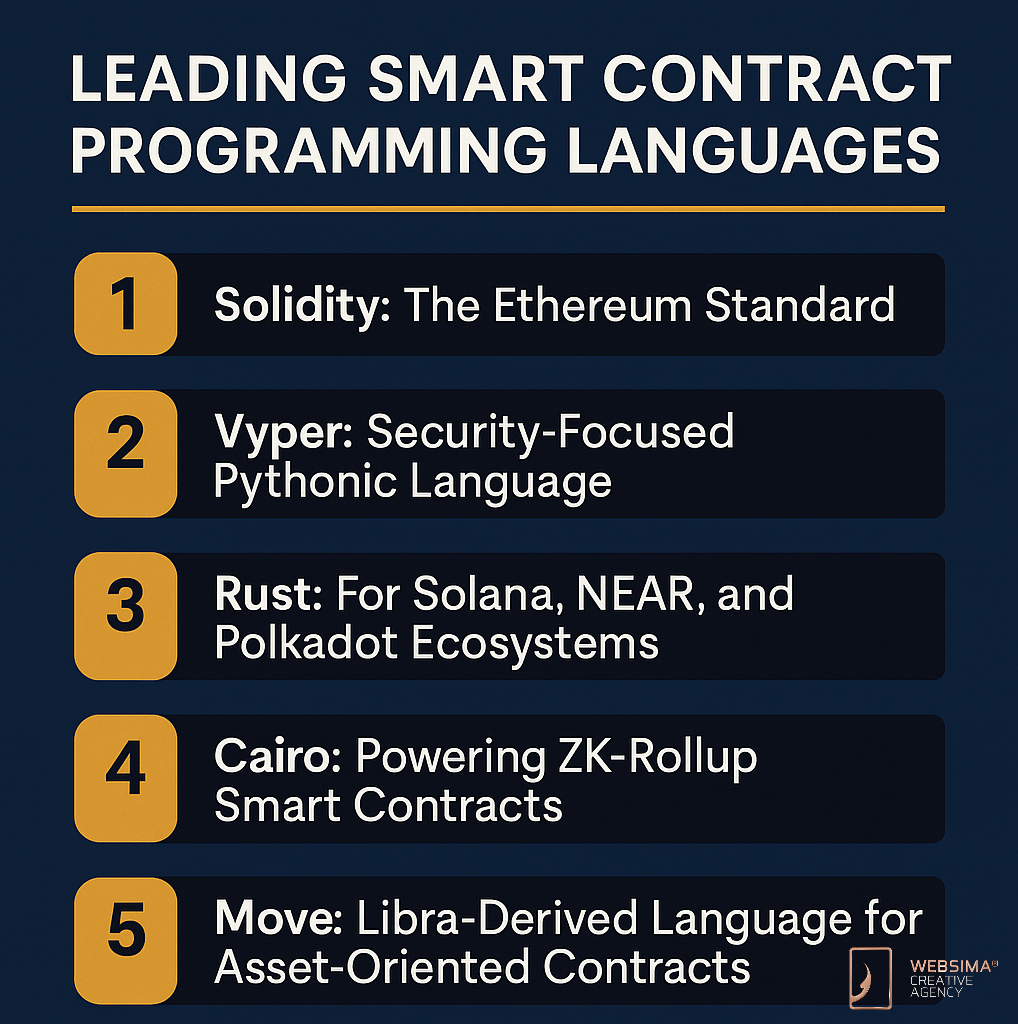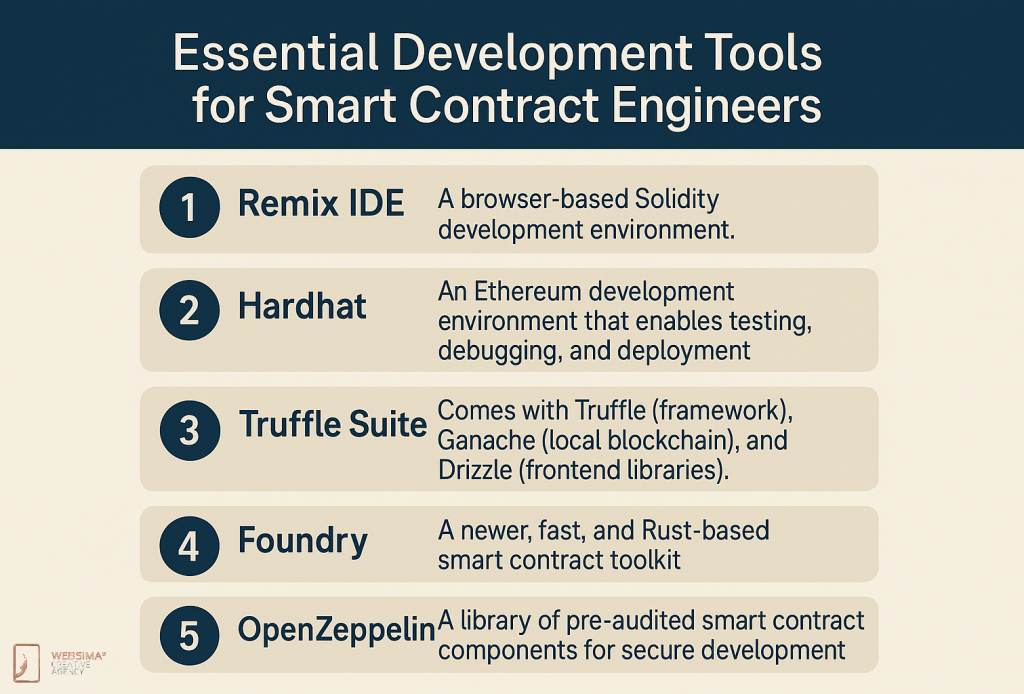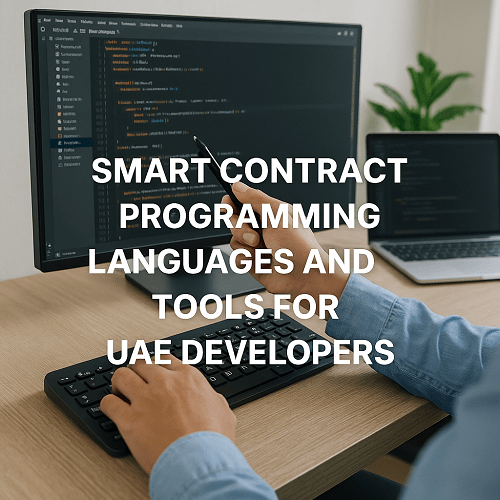As the UAE rapidly establishes itself as a global blockchain innovation hub, the demand for proficient smart contract developers has surged. With initiatives like the Dubai Blockchain Strategy and Emirates Blockchain Strategy 2021 laying the groundwork, both government and private sectors are actively deploying decentralized solutions. At the heart of these implementations are smart contracts—self-executing digital agreements coded with transparency and immutability and more importantly, the smart contract programming language.
In this guide, we explore the top smart contract programming languages and tools that UAE developers can leverage to build secure, scalable, and compliant decentralized applications (dApps). Whether you’re a startup founder in Abu Dhabi’s Hub71, a Solidity coder in Dubai Silicon Oasis, or a newcomer navigating Web3 protocols, this article equips you with the technologies shaping the smart contract ecosystem in the UAE.
Why Smart Contract Development Matters in the UAE
@bitgertbrise is the first Crypto Project to introduce their Electric car#Bitgert is organizing the launch event in Dubai
Bitgert blockchain ecosystem that includes smart contracts, staking, #NFTs, #DeFi solutions, and more.#Crypto #bitgertcommunity #BRISE pic.twitter.com/9fmx5CYwwn
— Crypto Insights (@CryptoInsightsX) October 14, 2023
Accelerating Blockchain Integration Across Sectors
From real estate tokenization to digital identities and DeFi ecosystems, the UAE’s blockchain applications are increasingly powered by smart contracts. According to a report by PwC Middle East, the UAE government expects to conduct more than 50% of its transactions using blockchain platforms.
Aligning with Regulatory Innovations
Dubai’s Virtual Assets Regulatory Authority (VARA) and Abu Dhabi Global Market (ADGM) are building frameworks for Web3 innovation. Smart contract programming must meet security, transparency, and operational compliance, underscoring the need for professional-grade tools and languages.
Leading Smart Contract Programming Languages in UAE’s Blockchain Scene

1. Solidity: The Ethereum Standard
Solidity is the most widely used language for writing smart contracts on Ethereum-based blockchains, including those used by many UAE startups and government initiatives.
Key Features:
- Object-oriented and statically typed.
- Optimized for EVM (Ethereum Virtual Machine).
- Supported by Truffle, Hardhat, and Remix IDE.
Use Cases in UAE:
- Real estate tokenization on Ethereum and Polygon.
- DeFi apps on Layer 2 protocols supported by regional ventures like Shorooq Partners.
Resources:
2. Vyper: Security-Focused Pythonic Language
Vyper is a smart contract programming language designed to be more readable and secure than Solidity, at the cost of fewer features.
Why UAE Developers Use It:
- Growing preference in compliance-heavy dApps.
- Simpler audits aligned with ADGM regulatory expectations.
Limitations:
- Limited IDE support.
- Smaller developer community than Solidity.
3. Rust: For Solana, NEAR, and Polkadot Ecosystems
Rust as another smart contract programming language is gaining momentum in the UAE thanks to the growing number of projects built on Solana, NEAR, and Polkadot—all of which favor Rust-based smart contracts.
Advantages:
- Memory safety and speed.
- Cross-chain compatibility.
Applications in the UAE:
- Used in experimental finance dApps.
- Preferred by UAE-based research labs and accelerator programs.
Resource:
4. Cairo: Powering ZK-Rollup Smart Contracts
Cairo, developed by StarkWare, is designed for zero-knowledge rollups, a major area of focus for scalability solutions.
UAE Significance:
- Web3 infrastructure projects in Dubai exploring privacy-preserving technologies.
- Ideal for financial dApps requiring on-chain confidentiality.
5. Move: Libra-Derived Language for Asset-Oriented Contracts
Move, originally developed by Facebook’s Diem project, focuses on safe resource management.
UAE Adoption Outlook:
- Still emerging but relevant for developers exploring Aptos and Sui chains.
- Interest rising among fintech firms exploring token-based payments.
Essential Development Tools for UAE Smart Contract Engineers

1. Remix IDE
A browser-based Solidity development environment.
Why it’s popular in the UAE:
- Beginner-friendly and doesn’t require local installation.
- Often used in workshops by government-sponsored blockchain bootcamps.
2. Hardhat
An Ethereum development environment that enables testing, debugging, and deployment.
Ideal for:
- Professional-grade dApps with complex dependencies.
- UAE startups developing full-stack Web3 applications.
3. Truffle Suite
Comes with Truffle (framework), Ganache (local blockchain), and Drizzle (frontend libraries).
Use Cases in UAE:
- Common in hackathons like Gitex Global DevSlam and Blockchain Life Dubai.
- Supported by regionally funded Ethereum-based projects.
4. Foundry
A newer, fast, and Rust-based smart contract toolkit.
Why UAE devs use it:
- Fast testing and fuzzing for contract robustness.
- Gaining traction in Ethereum-compatible rollups explored by UAE’s innovation hubs.
5. OpenZeppelin
A library of pre-audited smart contract components for secure development.
Key Benefits:
- Reduces vulnerabilities.
- Essential for contracts involving tokens, governance, and access control.
Resource:
Localized Frameworks and Developer Communities in the UAE
1. Emirates Blockchain Developers Guild
A national initiative aimed at educating and connecting blockchain developers through workshops, events, and certification programs.
2. ChainIDE with Arabic Support
Supported in the Middle East, ChainIDE offers localized documentation and enables development on EVM-compatible chains. It’s used in universities and by incubators across Dubai and Sharjah.
3. UAE Hackathons and Incubators
Key programs supporting smart contract developers:
- Gitex Global Hackathons
- Crypto Oasis Founders Hub
- Hub71 in Abu Dhabi
- DIFC FinTech Hive
These provide access to mentorship, grants, and regional blockchain networks for early-stage developers.
Security Practices Every UAE Smart Contract Developer Must Follow
Code Auditing Is Non-Negotiable
With regulators like VARA and ADGM setting high standards for dApp security, every smart contract must be thoroughly audited.
Tips:
- Use automated audit tools like MythX or Slither.
- Conduct third-party reviews before deployment.
Gas Optimization Matters
High gas usage can reduce dApp efficiency. Languages like Solidity and tools like Hardhat support optimization techniques that are critical for minimizing costs.
Multi-Chain Testing Is Essential
UAE startups often deploy across Ethereum, Polygon, and BNB Chain. Tools like Tenderly or Foundry help test multi-chain deployments.
Challenges of Smart Contract Programming Languages Faced by UAE Developers
1. Regulatory Ambiguity
Although VARA and ADGM are proactive, developers sometimes face gray areas in smart contract compliance—especially in cross-border DeFi applications.
2. Talent Shortage
Despite growing interest, the number of senior smart contract developers in the UAE is still limited. This creates a bottleneck for startups scaling their Web3 offerings.
3. Toolchain Fragmentation
Newer languages like Move or Cairo are not as well supported in terms of UAE-specific tools or local mentorship, slowing down adoption.
What’s Next for Smart Contract Programming Languages in UAE?
Institutional Support Is Expanding
Dubai Future Foundation and UAE’s Ministry of AI are actively funding blockchain research and offering grants for smart contract-based pilot projects.
Education Is Going Local
Universities such as Khalifa University and AUD are introducing blockchain-focused degrees, training the next generation of developers in languages like Solidity and Rust.
Regional Specialization Is Emerging
Abu Dhabi is becoming a hub for DeFi and financial dApps, while Dubai is positioning itself as the go-to center for NFT and metaverse-focused smart contracts.
Final Thoughts
As the UAE fortifies its status as a blockchain powerhouse, smart contract programming is no longer niche—it’s foundational. From Solidity on Ethereum to Rust on Solana and Cairo for ZK-rollups, developers in the UAE have a growing array of languages and tools tailored for secure, scalable dApp deployment. Whether you’re building fintech apps, token marketplaces, or governance DAOs, mastering smart contract programming in the UAE context is your gateway to Web3 innovation.
Ready to Build Blockchain Solutions in the UAE?
At Websima, we specialize in delivering high-performance blockchain and Web3 solutions tailored for businesses in Dubai and the greater UAE. Whether you’re launching a DeFi platform, NFT ecosystem, or custom token infrastructure, our team supports smart contract development across Solidity, Rust, and more.
We don’t just write code—we help you navigate compliance, deploy across chains, and integrate with secure backend systems that scale. From startups to government-backed ventures, Websima brings the technical expertise and local understanding you need to succeed in the UAE’s competitive blockchain market.
Ready to get started? Contact our blockchain team today and let’s build the future of smart contracts in the UAE.





